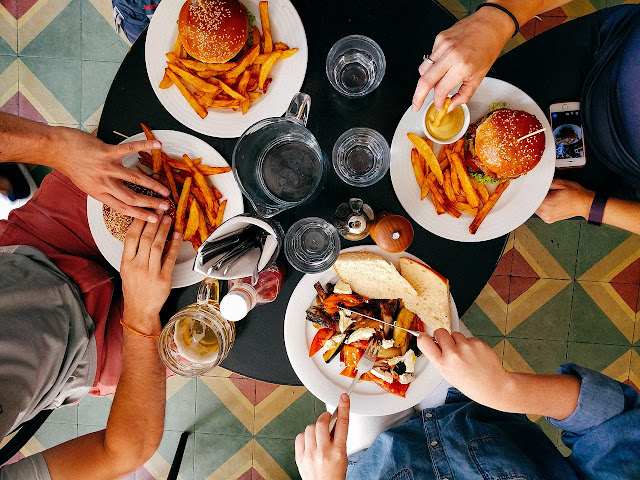6 Reasons That Makes Us Overeat – You Should Know
Overeating is an extremely common problem that almost everyone has faced at some point in their relationship with food. We overeat for an infinite number of different reasons ranging from stress to pleasure to prolonged nutrient deficiency. But there are also some common patterns in overeating, and being aware of these patterns can be helpful in taking steps in another direction.
 |
| 6 Reasons That Makes Us Overeat |
Eating in Emotional Excess
Our moods can definitely contribute to our risk of overeating. Research studies in this area repeatedly show that negative moods result in an increased risk of overeating. These negative moods can include fear, sadness, anger, resentment, frustration and stress. Sometimes a diet can trigger a negative mood on its own if the daily eating plan is too restrictive, unpleasant or lacking in creativity. One of the reasons I trust the ability to lose weight of the healthiest foods in the world is the pleasure, we get from eating them! With fresh, whole, natural and delicious recipes that are easy to prepare. The risk of a negative mood caused by diet alone is likely to decrease. Of course, for other sources of negative moods, such as work problems, relationship problems or continuous stress, it is important to start looking for better lifestyle solutions in these areas.
Eating in External Excess
In short, overeating externally means overeating as a result of an overemphasis on the food stimuli that are around you. We live in a culture that is surrounded by food, not only in food markets of service stations and community meetings. But also in television commercials, advertising posters and advertising of all kinds. The more involved we are in these signals, the more likely we are to overeat.
In research studies on external overeating, the presence of fast foods, convenience foods and other pre-packaged foods available instantly is related to the tendency to overeat. The healthiest foods in the world, although are very easy to obtain and prepare, are not "readily available". Enjoying them as the main components of your daily meal plan requires a little effort. In fact, this small effort can generate large dividends by limiting the risk of overeating externally.
 |
| 6 Reasons That Makes Us Overeat |
Restriction of Overeating
The best researched pattern when it comes to overeating may be the pattern known as overeating triggered by restriction. In this pattern, there is basically a rebellion that occurs within us when we have placed too severe limits on the foods that we allow ourselves to eat. The more unreasonably we limit ourselves, the greater is our risk of overeating.
In some cases, researchers have speculated that a specific region of our brain, called the ventro medial prefrontal cortex (VmPFC), may be involved in this pattern of overeating triggered by restriction. The VmPFC is partially responsible for our ability to consider the long-term consequences when making an immediate decision. People with damage in this region of the brain more often make decisions that focus only on the here and now, without discovering how to make the long-term consequences benefit them. Excessively restrictive diets can place us in exactly the same type of situation. We will tend to forget the long-term aspects of weight loss and health for life, and instead, we will think only of all the foods we have lost in the past 24 hours. The diet plan to lose weight in a healthy way not only avoids eating too restrictively, but also encourages daily meal plans that feel normal, natural, tasty and freely chosen.
Overeating due to Misjudgment
Overeating does not necessarily mean that the size of large portions looks ridiculously large on your plate. Nor does it necessarily mean a second or third help. When it comes to controlling weight, most people have difficulty estimating the amount of food they are eating. A fairly small error in judgment can be the difference between weight loss and weight gain. For example, suppose you eat a salad five days a week, and you think you are using a tablespoon of vinegar dressing and oil in your salad when you are actually using two tablespoons. Over the course of a year, this one-spoon difference will add up to 31,200 calories or nine pounds of weight!
 |
| 6 Reasons That Makes Us Overeat |
The subtle nature of overeating
Most individuals do not overeat, consuming vast amounts of food that seems ridiculous to the naked eye. They eat in excess, making rather small errors in the judgment about the size of the portion. An error of 20 calories per day can result in a weight gain of approximately one pound every six months, and a 20-calorie error is exceptionally easy to commit. For example, as a single cashew contains approximately 10 calories, a person who ate 12 cashews per day and believed that only with 10 nuts would have a loss of 20 calories and one pound every six months.
Overeating is partly natural
Eating too much of a tasty meal is not only common but also natural. It is natural to want more when a meal is delicious. If you judge strictly by the response of your taste buds, you have many chances to overeat. That's why I always focus on the issue of nutrient richness when I recommend the healthiest foods in the world as the mainstay of your weight loss plan. In addition to the delicious taste, I know that an optimal supply of nutrients is essential to avoid overeating. No food can provide a greater variety of nutrients or a greater amount of nutrients than the healthiest foods in the world.




0 Comments